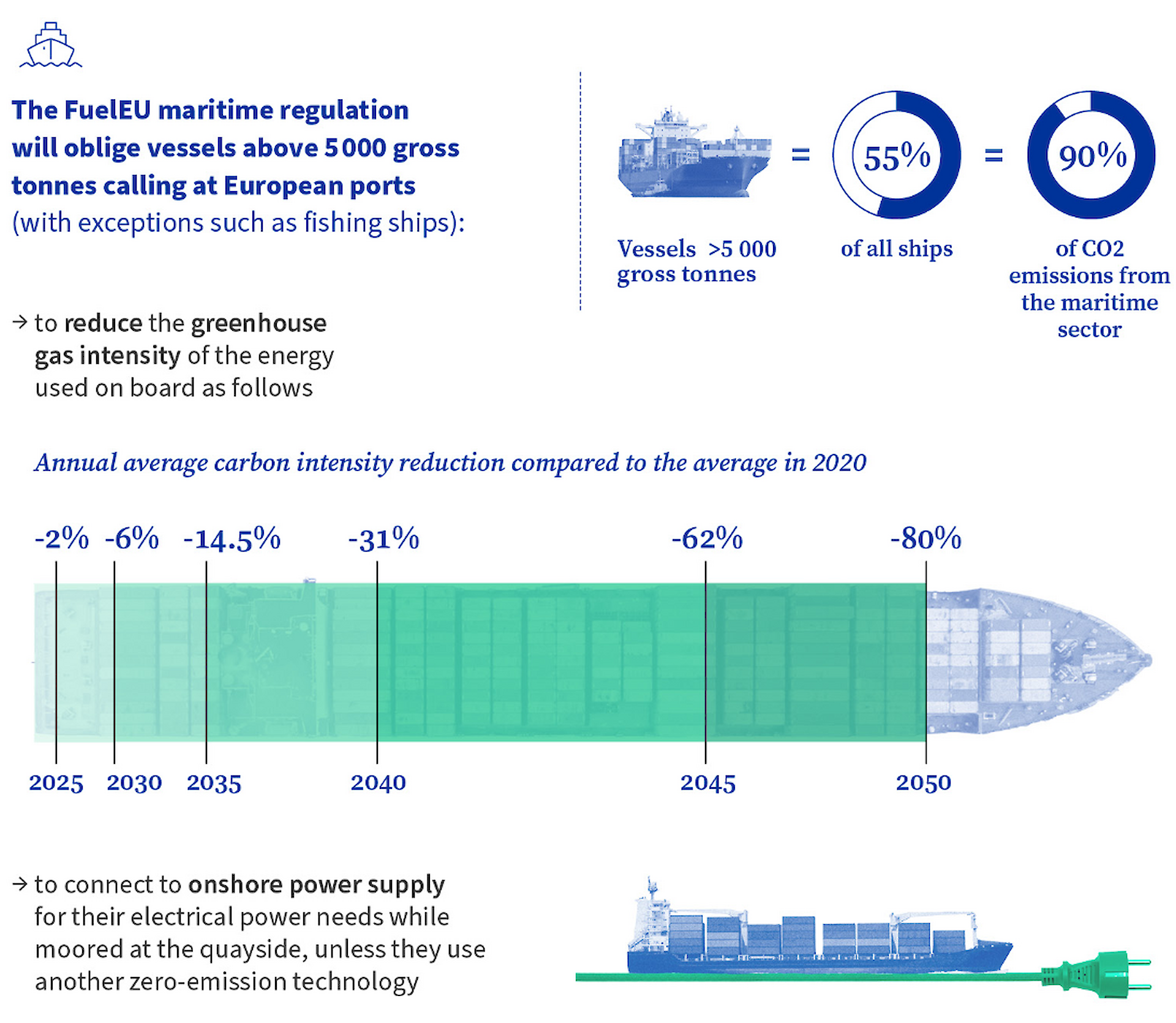

25 Jul 2023 14:58 Environment
EU Member States cleared the way to bring sustainable renewable fuels into maritime transport. They approved the "FuelEU Maritime" regulation today. On 12 July, the EU Parliament had also voted in favour of the agreement reached in the trilogue procedure.
The new requirements will apply to ships with a gross tonnage of more than 5,000 entering, leaving or staying in ports in the territory of an EU Member State. In addition, shore-side electricity will be mandatory for container and passenger ships from 2030. The use of synthetic fuels from renewable energies will be specifically promoted for shipping.
Federal Minister of Transport Dr Volker Wissing:
After we were recently able to achieve a breakthrough for maritime climate protection at UN level, we are now pushing the actual transformation towards climate-neutral shipping at European level with the "FuelEU Maritime" initiative. The draft regulation is open to technology and takes into account the special competitive conditions in the maritime transport sector. The main objective is to increase the demand for renewable and low-carbon fuels and their consistent use, thereby decisively reducing greenhouse gas emissions in maritime transport. The initiative is thus expected to play a fundamental role in the implementation of the European Climate Change Act for shipping.
Federal Environment Minister Steffi Lemke:
Today the EU has set a decisive course for more climate protection and the use of renewable fuels in maritime transport. Shipping companies will continue to rely on fuels in the future, because electric drives are not yet an option for long-distance transport. In maritime transport, e-fuels from renewable energies are therefore a sensible climate-friendly alternative. With the new requirements, the EU is giving manufacturers and shipping companies the necessary planning security, driving forward the development of modern technologies and making renewable fuels for maritime transport ready for the market. But there are also shadows: The fact that fuels from fossil sources and nuclear energy are also permitted as a compliance option is regrettable. The German Federal Ministry for the Environment, Nature Conservation, Nuclear Safety and Consumer Protection (BMUV) will continue to advocate the use of predominantly synthetic fuels from renewable energy sources in order to make maritime transport climate neutral.
FuelEU Maritime lays down uniform EU-wide rules for limiting the greenhouse gas intensity of the energy used on board a ship, and thus above all the fuels. The regulation from the Fit for 55 package stipulates that shipping in the EU must reduce its emissions by 2 percent from 2025, 6 percent from 2030, 14.5 percent from 2035, 31 percent from 2040, 62 percent from 2045 and 80 percent from 2050. The GHG intensity reduction targets are set against the 2020 average GHG intensity of energy consumed on board ships. The greenhouse gas emissions of all fuels are assessed on the basis of a life cycle assessment (so-called well-to-wake (WtW) approach that includes the greenhouse gases carbon dioxide, methane and nitrous oxide). All fuels are permitted as a compliance option; the legislative initiative is thus technology-neutral.
The use of synthetic fuels is encouraged by a special mechanism: if the share of synthetic fuels from renewable energy sources (so-called "renewable fuels of non-biological origin, RFNBO) in the fuel mix does not exceed one percent in 2031, a mandatory minimum quota of two percent for these RFNBO fuels will automatically come into force from 2034. Beyond the use of alternative fuels, the FuelEU Maritime Regulation obliges container and passenger ships in ports in the territory of a Member State to use shore-side electricity or alternatively zero-emission technologies for on-board energy supply.
This Regulation shall enter into force on the twentieth day following that of its publication in the Official Journal of the European Union. It shall apply from 1 January 2025, with the exception of certain Articles which shall apply from 31 August 2024.
The EU member states have agreed to the "FuelEU Maritime" regulation.
Federal Ministry of Digital Affairs and Transport
For questions regarding content:
E-mail: buergerinfo@bmdv.bund.de
For press enquiries:
Tel.: +49 30 18 300 - 7200
E-mail: presse@bmdv.bund.de